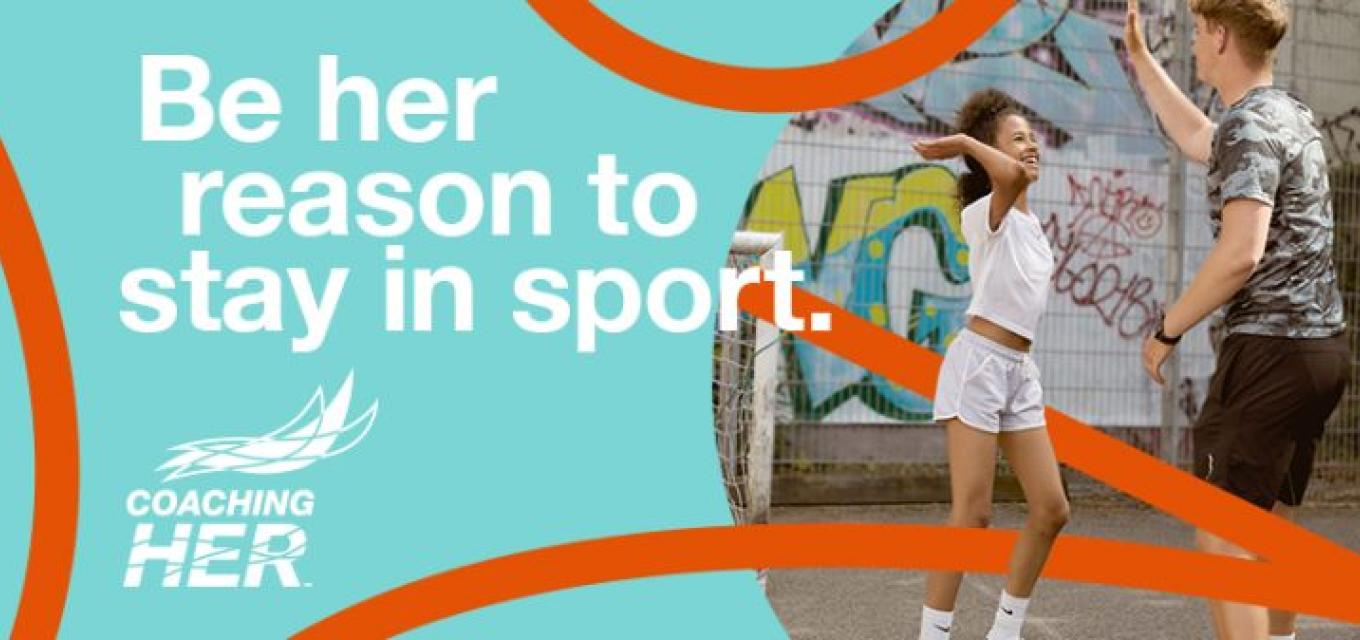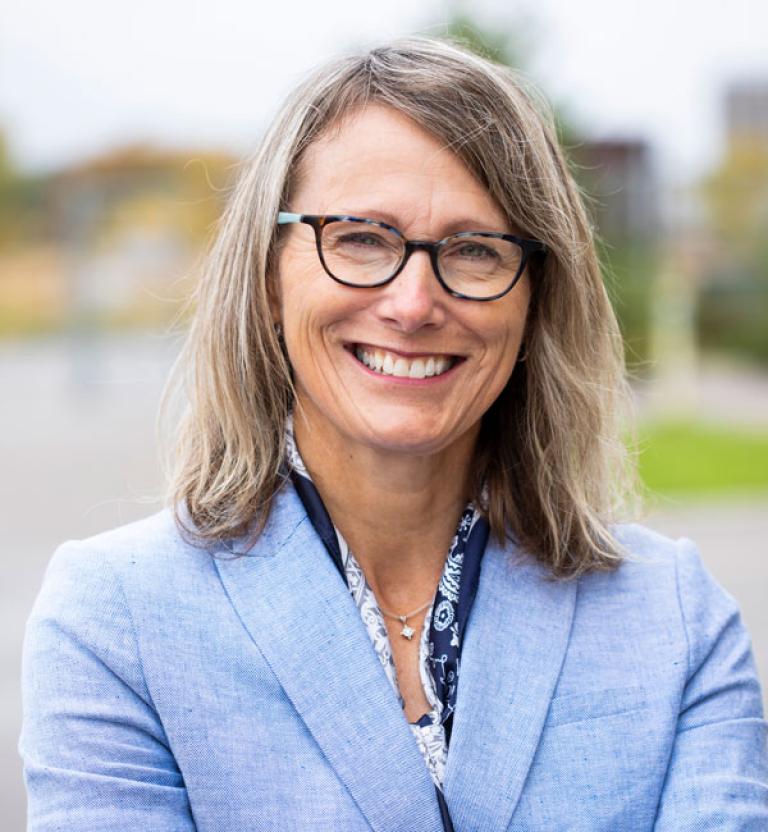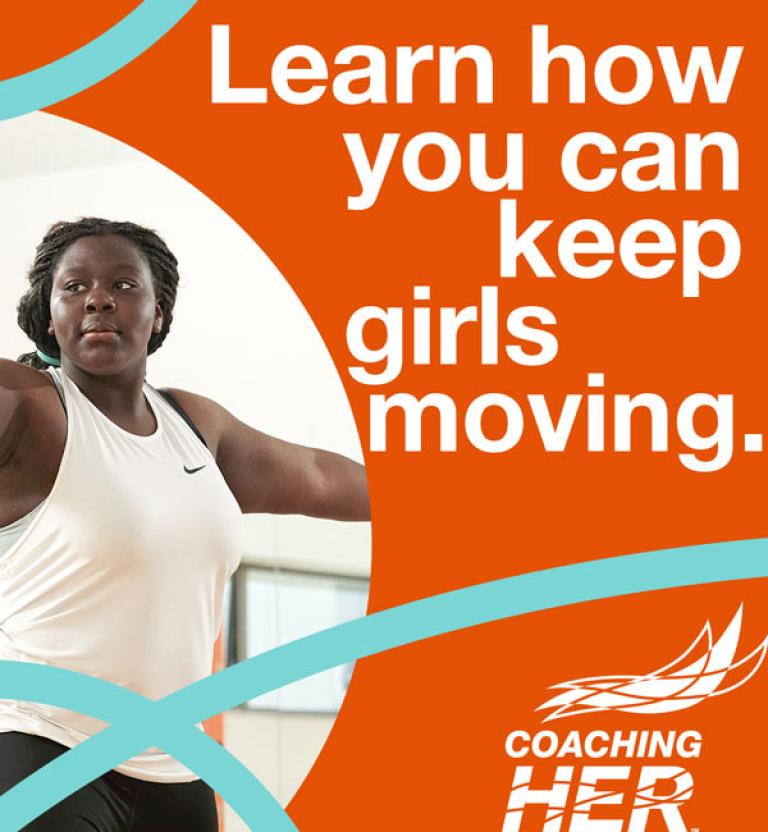2023 Fall

Helping girls reach their full athletic potential
Online tool Coaching HER takes aim against biases and inequalities in girls’ sport.
Last year saw the celebration of a half-century of the impact of Title IX, passed into law on June 23, 1972. Title IX prohibits sex-based discrimination in any school or educational setting that receives government funds. The passage of the act led to a dramatic increase in the number of girls participating in school-based sports.
Even though much progress has been made due to Title IX, girls still face many challenges and barriers in athletic activity. Research shows that girls have fewer resources and opportunities to be physically active and tend to enter sports later and drop out earlier as compared to boys. Additionally, estimates are that more than 75 percent of girls aged 11 to 17 do not get enough physical activity to accrue health and developmental benefits, and the COVID-19 pandemic only exacerbated the problem. One question remained consistently unanswered and underfunded—how do we collaborate to remove barriers and increase supports to keep girls physically active?
Back in the fall of 2019, sportswear giant Nike approached Dr. Nicole M. LaVoi to discuss a potential partnership and answer that question. LaVoi is the director of the Tucker Center for Research on Girls & Women in Sport. Based in the School of Kinesiology, the Tucker Center is a pioneering thought leader in the field and often sought out to help design action-oriented, evidence-informed solutions.
Nike noted a 2018 Tucker Center report that demonstrated girls are more likely to drop out of sports when they internalize gender biases and stereotypes. Bolstering their confidence would go a long way toward keeping them in athletics. This was the common goal Nike and the Tucker Center looked to achieve.
“The values and mission of the Tucker Center and my colleagues on the Social Community Impact Team at Nike were aligned to have the chance to make a real impact for girls in sport,” LaVoi says. “Many ideas were discussed and we landed on what became Coaching HER. That was our starting point, and we have never looked back.”

Coaching HER
Coaching HER is a free, online, and interactive coach education program. “Coaches are extremely busy people,” says Anna Goorevich, a research assistant at the Tucker Center. “Having an online education program with short, flexible, and impactful sessions is something that Coaching HER does differently than other coach education programs, which may require coaches to pay out of pocket and attend in-person.”
Courtney Boucher, assistant director for research and programming at the Tucker Center, says the goal is to have as many coaches as possible take Coaching HER. “Each module is designed to be interactive and can be completed in just 20 minutes,” she says.

The program is focused on providing coaches with the tools they need to effectively keep girls in sport. “Coaching HER allows the coach to be in the driver’s seat by creating their own learning journey,” Boucher says. “All coaches will learn sequenced foundational information specific to coaching girls and then be able to focus on areas where more help or knowledge is needed.”
LaVoi is the product owner of Coaching HER and Boucher serves as its program manager, working with LaVoi and overseeing module creation, development, web components, and dissemination.
Recognizing bias
What makes Coaching HER a unique program is that it addresses the ways in which girls are layered in gender bias or stereotypes, Goorevich says. “Too often in the coach education world, discourses around ‘how to coach girls’ are dominated by preconceived notions or limiting beliefs of girls’ abilities and personalities,” she says. “That can have harmful impacts on girls’ sport experiences. Coaching HER directly helps coaches acknowledge subconscious gender biases to help make sport experiences more enjoyable, safe, and empowering for all athletes.”
Coaching HER begins by creating awareness about how gender stereotypes and bias both consciously and unconsciously influence coaches and their attitudes. “Everyone has bias,” Boucher says. “But when coaches increase their awareness and break down biased thinking, they can then work to minimize the harmful impact of stereotypes and bias on the girls they coach. We believe that all girls deserve coaches who help them succeed and thrive in sport and physical activity.”
The feedback received so far from coaches using the tool has been overwhelmingly positive. “Coaches have enjoyed interacting with the content and have reported learning about their own gender biases and how those biases may influence the way they coach,” Boucher says. “I’m excited for coaches to continue to reflect on their role in making the sporting landscape better for girls and women, because what is good for girls and women is good for everyone.”
Goorevich says she is excited about the program’s potential for growth. “The foundation modules are currently live, but we are busily creating new content to address specific experiences and needs that come with girls’ sporting lives, such as menstrual health, body image and body confidence, and mental health,” she says. “Coaching HER is dynamic and constantly evolving.”

LaVoi says she sees Coaching HER’s product line growing to impact many different populations of girls and women, such as college athletes, masters athletes, mothers, and women coaches.
“My hope is Coaching HER is the place to go for credible, high-quality, free information for those who care about coaching girls and women,” she says. “My hope is every sport club, team, school, and sport federation has Coaching HER as part of its coach education program. My hope is every coach developer or textbook about sport coaching contains mention to or content about Coaching HER. Ultimately, my hope is that gender bias and stereotypes about girls and women in sport become a relic of the past and that all individuals who are female identifying enjoy a sport culture where they are safe, valued, and supported to become their best selves.”
LaVoi adds that she is particularly grateful that Nike has provided the Tucker Center with this opportunity to accelerate systems change together. “Coaching HER represents the best of what can transpire from an academic-industry partnership and collaboration,” she says. “I had the vision and expertise for Coaching HER content creation, but without the support and belief of Nike, it would never have been developed.”
-KEVIN MOE